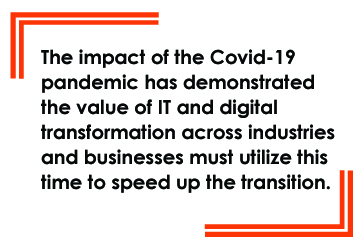
Delhi3:42 AM | 27th April 2024
The pandemic has set foot in India and may lead the country towards a major slowdown. The trade impact of the coronavirus epidemic for India estimated to be about 348 million dollars and the country figures among the top 15 economies most affected as slowdown of manufacturing in China disrupts world trade

The spread of COVID-19 is an epidemic affecting hundreds of thousands of people worldwide, with significant economic implications to linger for years to come. This is not the just another turn of the business cycle, but a shakeup of the world economic order. The economic impacts are beginning to be felt, and many economists are predicting a deep recession of unknown length. The Organisation for Economic Co-operation and Development (OECD) has expressed that the coronavirus could cut global economic growth in half, with industries across the board facing fallout.
The pandemic has set foot in India and may lead the country towards a major slowdown. The trade impact of the coronavirus epidemic for India estimated to be about 348 million dollars and the country figures among the top 15 economies most affected as slowdown of manufacturing in China disrupts world trade, according to a UN report. Whereas according to Asian Development Bank (ADB) the Covid- 19 outbreak could cost the Indian economy between $387 million and $29.9 billion in personal consumption losses. Remittances to India are likely to fall by 23% to $64 billion this year as the pandemic impacts jobs and wages globally, Consumer spending (including summer essentials such as home appliances, soft drink and ice cream) has taken the hit owing to the country’s lockdown. The stock market has fallen leading to reduction in wealth effect. With lockdowns across markets, foreign buyers are postponing orders, and asking for hefty discounts. Goods in transit goods are also not moving. Those already dispatched are also finding no takers on various foreign ports. Low profitability and production disruptions along with low consumer spending has affected business sentiments and investments.
No doubt, its hardest time for business with no topline. As the coronavirus pandemic has upended our daily routines, staying focused and productive without clear boundaries can pose a challenge. Big, ambitious projects can be both friend and foe — inspiring us to do our best work but often intimidating us to the point of paralysis. The COVID-19 crisis is not only disruptive to every company, but it has created a “Big Reset”
I foresee seven different ways in which the business environment is likely to transform in the coming days
THE SHIFT TOWARDS LOCALISATION
COVID-19 has been the black swan event that finally forced many companies, and entire industries, to rethink and transform their global supply chain model. The shrinking of the supply chain footprint dynamic may accelerate as companies seek a different cost/resilience trade-off and look to localize production and sourcing. This expects to lead more localization of supply chains, especially of essentials & for sectors which are strategically important.
GOING DIGITAL IS IMPERATIVE

Manual and on premise solutions no longer make the cut. Many small, mid-sized and even global organizations today still rely on ad-hoc, manual processes to get the job done – but relying on error-prone manual administration only guarantees that eventually, processes will break. An ERP implementation may appear stable on the surface, but the moment trouble arises – a pandemic, for example – the system is effectively shut down, rendering it inaccessible if it is entirely on-premise. It’s time to use these uncertain times as a wake-up call, and ensure safety and security is built-in to an organization’s system from the get-go.
The impact of the Covid-19 pandemic has demonstrated the value of IT and digital transformation across industries and businesses must utilize this time to speed up the transition. This would have far reaching implication on B2B, B2C, B2G services, commercial real estate, e-commerce, e-governance, cyber security, process automation etc.
CASH IS THE KING FOR THE BUSINESS
The crisis has reiterated that Cash is the king, which is less valuable on the balance sheet is today’s most valuable asset. The crisis has retaliated that over levered companies are more vulnerable as compared to financially prudent companies
MOVE TOWARDS THE VARIABLE COST MODEL
With revenue streams drying up, companies are forced to restructure their workforce. Reduced working hours, work without pay, salary cuts and downsizing the workforce are new norms which are expected to stay. More specifically, layoffs seem inevitable in the many sectors were cash flows have dried up almost completely. Small and mid-size local businesses would be the worst affected as they struggle to cover fixed costs. Businesses will now have to learn outsourcing to reduce the fixed cost.
BUILDING AGILITY
“Crisis response” is not something you do once every few decades. Every company will have a “Black Swan” event on a periodic basis. With consumers moving online in reaction to coronavirus restrictions, companies will need to learn how to launch new e-commerce businesses quickly. Going forward, policies will need to evolve faster than the market and policymakers will need to be more responsive, inclusive and agile.
LEADERSHIP MATTERS NO MATTER WHAT
Leaders have to be now worried about revenue, executive and workplace safety, continuity, and offering sound and ethical policies to employees. There will be layoffs, restructuring, and many difficult financial and human decisions ahead.
Finally, let’s just accept that most of the changes in The Big Reset are here to stay. Today’s challenges have shown us that we need resilient enterprise systems to help us with these processes as they tie directly into resource productivity, utilization, project and business profitability, and other critical business metrics. Investing in an effective solution can revolutionize how you manage your projects and resources when the world throws you a curveball.
Copyright© educationpost.in 2024 All Rights Reserved.
